If you’re just dipping your toes into online business and trying to puzzle out the differences between Squarespace vs WordPress, then you’re not alone.
Both Squarespace vs WordPress offer very contrasting approaches to build up a website as well as provide different eCommerce features. Hence, doing a bit of research about these two platforms before committing is surely a smart move
In this article, LitExtension – #1 shopping cart migration expert will help you cover the ins and outs of both Squarespace vs WordPress in 9 critical criteria.
Hopefully, by the end, you’ll be able to figure out which platform is the perfect fit for your specific blend of objectives, needs and budget.
Overview
Both Squarespace vs WordPress are top-of-the-line solutions for online business. Squarespace is a hosted website builder which has always been heralded for its dedicated customer support and sleek templates. Meanwhile, WordPress is an open-source Content Management System (CMS) that has the largest user base and is widely praised for its high customizability.
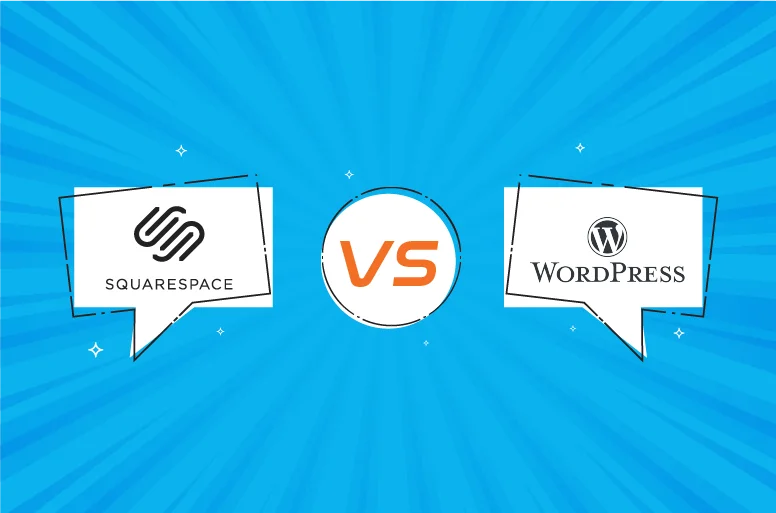
What Is Squarespace?
Originally created in 2004 as a blog-hosting service, Squarespace has since flourished to become an incredibly popular website builder.
It is, at the time of this writing, powering about 2 million websites on the Internet. It’s true that Squarespace is not as popular as its competitor WordPress. However, it is currently home to some of the most high-profile websites on the planet, such as Shutterstock, Skyscanner, Sciencemag.
What Is WordPress?
First launched in 2003, WordPress has quickly evolved to become a top-of-mind CMS for both individuals and organizations.
WordPress is by far the most popular CMS in the industry, powering over 30 million websites around the globe. SoundCloud, Bloomberg, The New York Times are some gorgeous websites that you probably have visited, but might not know were created on WordPress.
There are two versions of WordPress: WordPress.com vs WordPress.org. The former is the hosted solution whilst the latter is the self-hosted, open-source one.
In the case of this Squarespace vs WordPress battle, we’ll be solely looking at WordPress.org, which is the open-source version and is what most people are referring to when mentioning “WordPress”.
Need Help To Migrate Your Store?
If you are intending to migrate Squarespace to WordPress, LitExtension offers a great migration service that helps you transfer your data from the current eCommerce platform to a new one accurately, painlessly with utmost security.
Squarespace vs WordPress – 9 Things That Make A Difference
First, let’s take a look at this infographic for a quick comparison between Squarespace vs WordPress.
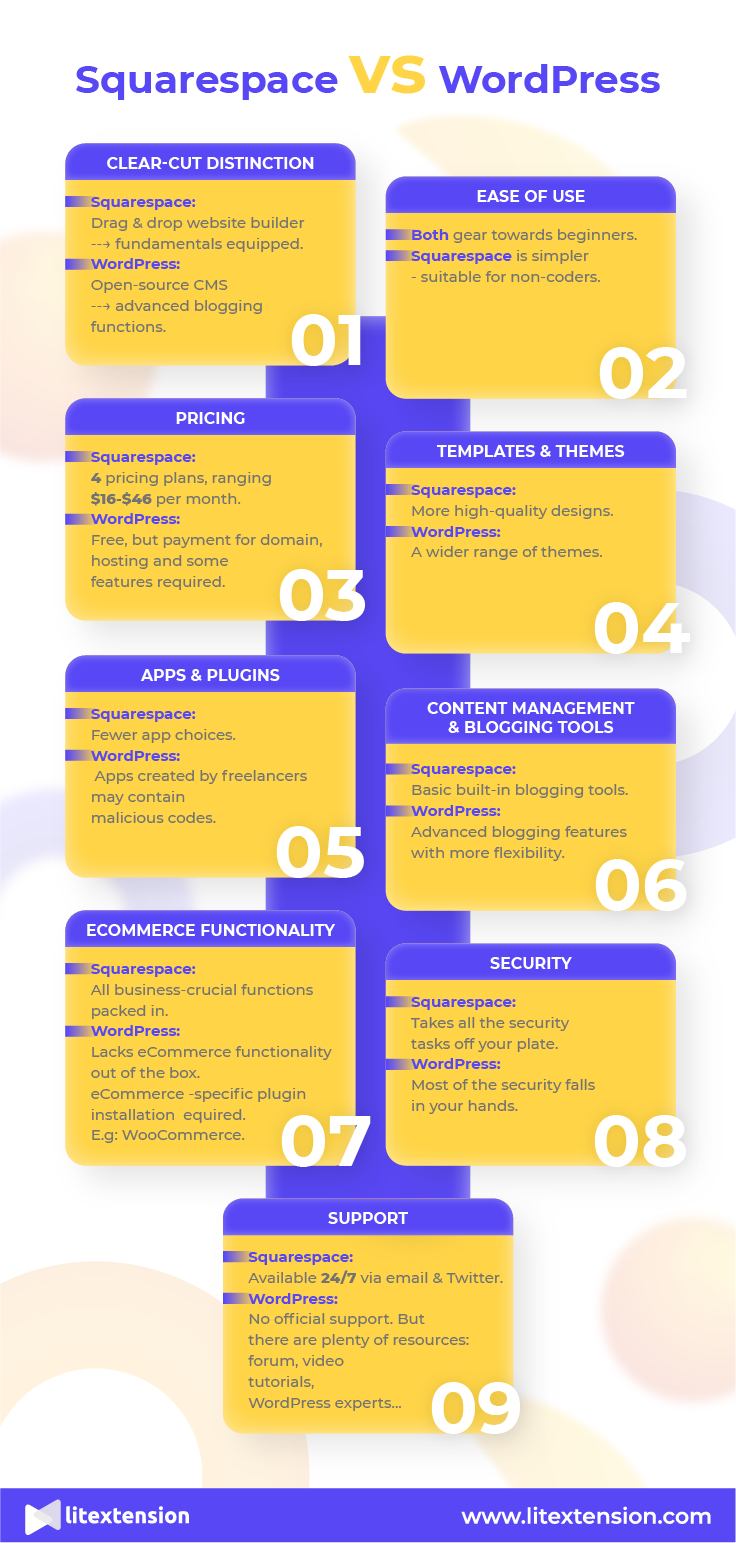
#1 Clear-cut Distinction
Before digging deeper into Squarespace vs WordPress, please note that there are philosophical differences between the two.
Squarespace is a drag-and-drop website builder where all the templates, attributes and security measures are provided right out of the box.
On the contrary, WordPress is an open-source CMS that generally has more advanced blogging functions than a website builder.
As a WordPress user, you’ll have more control, from choosing a theme to performing regular updates and managing your site’s security. It’s more work but it comes with the perk of flexibility and customizability.
#2 Ease of Use
Ease of use is an essential but often under-appreciated factor when choosing a suitable platform. This includes not only the learning curve to become familiar with the system, but also how simple it is to operate on a daily basis.
Squarespace Ease of Use
Squarespace is a great choice for true novices and non-techy users. With Squarespace, you can create a basic site in a couple of minutes. Being a hosted solution, Squarespace doesn’t require you to sign up for hosting or purchase a domain name to get started. All you need is to register a Squarespace account, pick a template, add some more features and you’re ready to get off the ground.

Squarespace interface is minimal and intuitive, allowing you to easily make changes to your site. You can add, move or delete images and sections or customize settings, including color palettes, fonts and page configurations.
Another wonderful thing about Squarespace is that it takes all the maintenance work off your plate. All Squarespace updates are in-house and automatic.
In case you’re still having difficulties with Squarespace, let’s check out our comprehensive Squarespace tutorial.
WordPress Ease of Use
Just like Squarespace, WordPress also gears towards beginners more than experienced users. It only takes a few minutes to figure out how the system works. But the installation process requires more time and effort investment.
You can find out how to set up WordPress in our WooCommerce tutorial below:
However, compared to Squarespace, WordPress has a steeper learning curve. This is due to the fact that WordPress is an open-source platform that relies on custom coding. If you wish to build a more custom-looking and custom-operating WordPress website, you may need to work with complicated code lines.
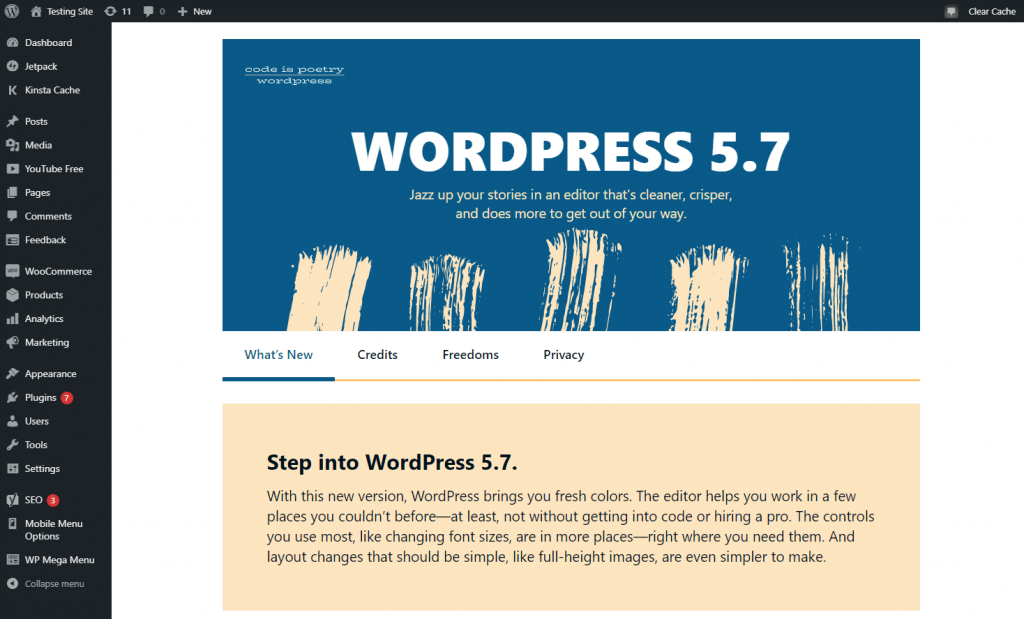
You’ve also got to be aware that WordPress has a regular update cycle, and you’re fully in charge of upgrading your WordPress site to the most current and bug-free version. The WordPress update process can be a bit of a bother as you need to back up data, update WordPress themes and plugins as well.
My experience with WordPress has been very positive so far. I am not a website developer, but I do design and update content. For that purpose WordPress is wonderful.
It has undergone great updates pretty regularly that have made designing and seeing your website edits easy.
Jordan M
Verdict:
Squarespace is simpler than WordPress, making it a smart choice if you’re not a tech guru. Nonetheless, WordPress is more powerful and flexible, making it the better option if you’re confident with code and you want to have more granular control over your site.
#3 Pricing
Before building a website, there are two crucial questions that need answering. The first is how much Squarespace vs WordPress cost, and the second is how much you’ll be willing to invest. In this section, we’ll help you clarify the former while the latter completely depends on your own configuration of your site.
Squarespace Pricing
There are four plans in Squarespace pricing, ranging from $16 to $54 per month. Its pricing structure is straightforward and aims at specific users.

The main differences between the Squarespace pricing plans involve
- Marketing & eCommerce features
- Whether you can add custom CSS and scripts
- Transaction fees
- Integration with certain third-party apps
Now, let’s break into the 4 Squarespace pricing plans:
- Personal: Ideal for those who want to create a basic website. This plan provides access to Squarespace’s stunning template repository, unlimited storage and 24/7 customer support. But if you intend to make money online, you should avoid this plan as it doesn’t facilitate eCommerce features.
- Business: A good choice for a personal business website. This plan comes with lots of notable eCommerce features such as inventory management, shipping tools and much more.
- Basic eCommerce: Everything needed to build up your online store is included in this plan. With this plan, you won’t have to spend a penny on transaction fees.
- Advance eCommerce: Upgrade to this package when your business expands. This plan offers a full set of Squarespace features such as Abandoned Cart Recovery, Automatic Discounts, Sell Subscriptions.
The good news is you can make use of a 14-day trial to try out Squarespace before deciding whether it’s your next destination or not.
WordPress Pricing
Is WordPress completely free?
Well no, not exactly. WordPress is free to download and use. But it’s not an entirely free ride, as you still need to purchase the following.
The estimated cost breakdown below will give you a good idea of how much you have to pay.
| Extras | Estimated Price |
|---|---|
| Domain | $12/year |
| WordPress hosting fee | From $3.95/month |
| Security | From $50, on-going or one-off charge |
| Developer fees | From $50/hr |
Due to its open-source nature, WordPress also greatly depends on customization themes and third-party plugins.
| Paid theme | From $30 |
| Plugins | $0-$1000 |
Beyond that, if you want to sell online, you’ll need the assistance of an eCommerce-specific plugin for WordPress (e.g: WooCommerce, Easy Digital Downloads, Ecwid) as well as some free and paid efficiency-enhancing features.
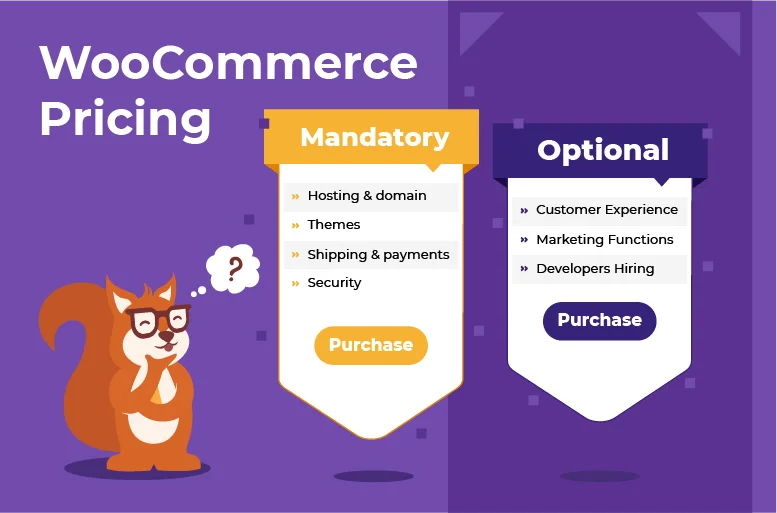
Verdict:
When comparing the pricing of Squarespace vs WordPress, it’s quite hard to give one single declaration about which platform is cheaper. The final answer depends on what type of website you want to build as well as what attributes you want to be entailed.
However, pricing is just one part of the whole picture — and not necessarily the most important one! So, let’s continue this Squarespace vs WordPress comparison by looking at other factors.
#4 Templates & Themes
When a potential customer lands on your website, you’ve got a matter of seconds to make a vivid impression. If your site looks scruffy, badly-designed and difficult to navigate, there’s a high chance you’ll lose customers to your competitors. Thus, choosing a suitable, eye-catching theme is the very first crucial step to attracting clients to your online store.
Squarespace Templates
This platform gets its name on the scoresheet by providing elegant, mobile-optimized templates. You can even utilize one of its prefabricated designs as a baseline and tweak it at your will. Once you’ve selected your Squarespace template, you can make it yours by adding images and videos or changing the fonts, colors and backgrounds.

Besides, all Squarespace templates come with a Product page. There are three styles of the Products pages: Classic, Advanced and Unique. In comparison to the Classic style, the Advanced one offers more features, such as Image Zoom and Quick View. Meanwhile, the Unique option supports more template-specific eCommerce attributes, like the Supply template with the product hovering option.
My favorite feature of Squarespace is the templates. If you want something that is 90% built out, this is the way to go. You pick your design, input text and a logo, then you’re done!
Luke S
WordPress Themes
When it comes to the number of available themes, WordPress outshines its competitor Squarespace. WordPress provides its users with a decent collection of themes – 9038 themes to be more exact. You can browse commercial themes, or even upload your own theme to host on WordPress.

Nevertheless, WordPress’s humongous theme library sometimes turns out to be a double-edged sword. Many themes mean different levels of quality. In fact, some WordPress themes were created years ago and they were not mobile-optimized. Thus, always check carefully to make sure your theme is mobile-responsive before purchasing.
Verdict:
With WordPress, you are choosing from a thousand of designs, whilst the Squarespace templates number in the hundreds. Nevertheless, Squarespace offers more high-quality designs and it’s way easier to customize your Squarespace templates.
#5 Apps & Plugins
Squarespace Apps
Squarespace offers in-house apps, including an analytics app, blog app, note app and portfolio app. In case you need more advanced functionality, you can turn to its separate app market called Squarespace Extensions.
Those Squarespace apps are not that plentiful but pretty much cover all the bases. Some notable Squarespace apps are Outfy, Shippo and EZ Texting.
WordPress Plugins
Being an open-source platform, WordPress is open to everybody to use and customize. Any developers or programmers can create their own tools such as themes, plugins and share for free, or sell to other WordPress users.

There are nearly 59,000 free and paid WordPress plugins, and this number goes up day by day. Basically, there is always something for your site, from logistics, marketing to payment gateways.
Verdict:
Compared to Squarespace, WordPress has a better range of add-ons. WordPress has thousands of plugins, while Squarespace just has a few in-house apps. But some WordPress apps created by freelancers may contain malicious codes, which then open up your site to security breaches.
#6 Content Management & Blogging Tools
A blog is a great way to connect with your audience or advertise your products. But not all websites are built to display a regularly updated stream of articles.

Fortunately, both Squarespace and WordPress are up to the task of supporting a high-quality blog. The thing is these two platforms offer slightly different tools to create a blog.
Squarespace Blogging Tools
Within Squarespace, blog posts can be tagged, categorized, and edited. They can also be excerpted, and a link to each new post can be automatically sent to social media feeds like Facebook, Instagram and Twitter.

Another great thing about Squarespace blogging features is that it offers free blogger templates. Squarespace users are free to choose from a wealth of modern interfaces that display blog posts on the homepage either in a single reverse chronological feed or in a more compact magazine-style grid.
WordPress Blogging Tools
What we perceive as the greatest feature of WordPress blogging is its ability to restore version history. Specifically, multiple versions of pages and posts can be stored on the system and you can roll back to any of them at any point.
Also, just like the competitor Squarespace, WordPress also has plenty of free WordPress templates that are tailor-made for bloggers.
And in terms of approaches to content management, the main differentiator between Squarespace and WordPress is on-page editing.
With Squarespace, you can just go to the page you wish to make some cosmetic tweaks and click on a bit of content to edit it: you’ll then see your edits in context on the page, as you make them. In WordPress — out of the box at least — you have to edit the page in the back end and preview or publish it before you can see the changes you’ve just made.

Especially, for serious bloggers who want to customize their own look, WordPress also lets users access HTML directly. Although you can add ‘code blocks’ in Squarespace, you are not given direct access to the main HTML behind your pages and posts.
Verdict:
When it comes to Squarespace vs WordPress for blogging, WordPress wins comprehensively.
WordPress allows you to use categories and tags more flexibly than Squarespace. Squarespace has solid, built-in blogging tools, but it just can’t beat WordPress in this content management area.
#7 eCommerce Functionality
Originally created as a blogging platform, WordPress lacks eCommerce functionality out of the box. This means that in order to sell online, you’ll have to install an eCommerce-specific plugin. This plugin will serve as a bridge that turns any WordPress site into an eCommerce store.
In this section, we will take the most popular eCommerce plugin of WordPress – WooCommerce as an example. So please be aware that when mentioning WordPress’s eCommerce features, we are actually talking about WooCommerce’s.
Product & Inventory Management
The Squarespace product creation module is super user-friendly, allowing you to easily manage your inventory and create dazzling product pages. With Squarespace, you can sell both digital and physical products, set up variants and SKUs.
Squarespace also lets you import products from your existing Etsy, Shopify, or Big Cartel store or via a CSV file. Additionally, you can manually import customers, orders, and other pieces of data.

WooCommerce supports selling digital, physical products and even services. Besides, you can incorporate things such as product add-ons and variants. Also, the product management interface is easy to navigate and follow, letting you arrange your product pages and keep track of your inventory.
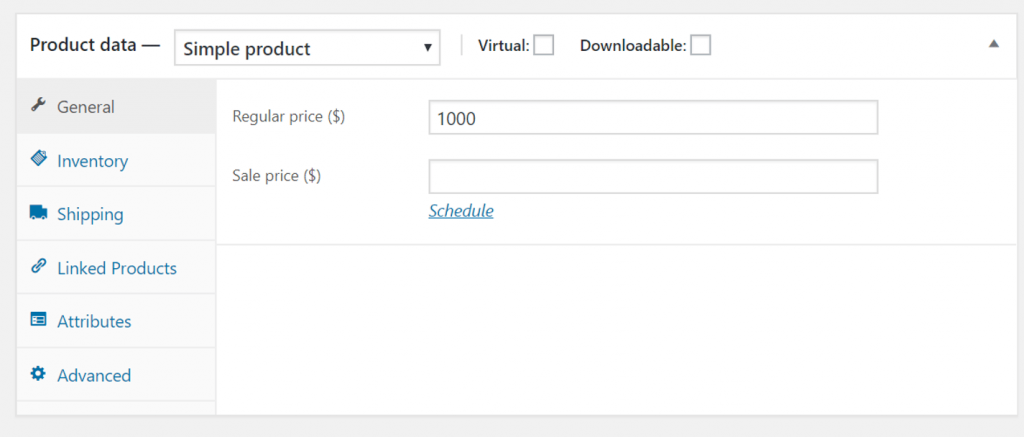
However, for large-scale stores with a great number of product variants, WooCommerce’s flexibility turns out to be a better choice. Squarespace imposes a 100 SKU limit on product variants, whereas WooCommerce has no limit.
Check out the detailed guide on how to create WooCommerce Variable Product.
Shipping & Tax
Shipping
Implementing effective eCommerce shipping strategies in place is an impactful step you can take to grow your online business. Here is the definitive guide to eCommerce shipping that you may need.
Currently, Squarespace has three shipping methods: Flat Rate, Depending on Weight and Carrier Calculated Shipping.
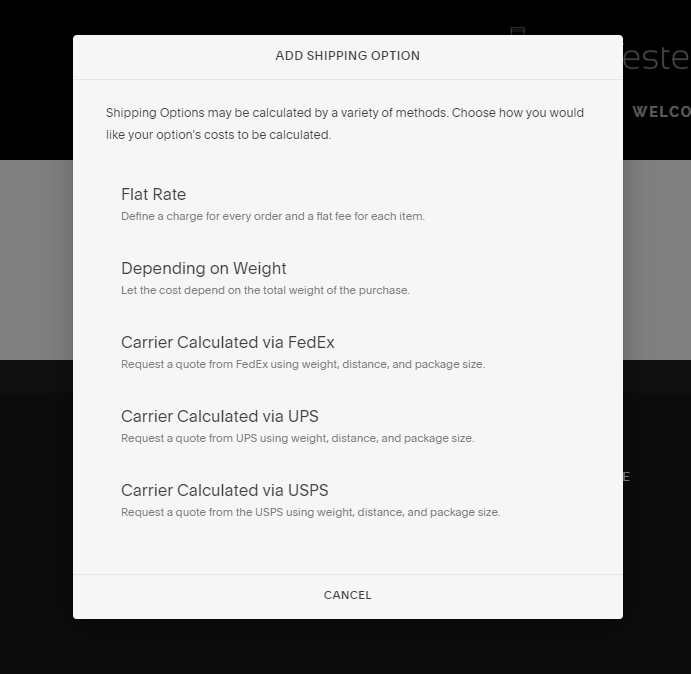
With Flat Rate, you can either offer the shipping fee on the whole order or per product. This option also allows free shipping. Or else, you can pick the Depending on Weight option to define specific shipping cost ranges based on the weight of the item. For more convenience, you can choose Carrier Calculated shipping either by FedEx, UPS or USPS. This option will give you the exact fee regardless of shipping distance and the parcel’s weight.
Similarly, WooCommerce offers 3 shipping methods. They are Flat Rate, Free Shipping and Local Pickup.
- Flat Rate: Create a standard rate per item, order.
- Free Shipping: You can offer free shipping on any order or set the “Free shipping requires…” field.
- Local Pickup: Customers can pick up their parcels at no cost.
Tax
With Squarespace, you can create tax rules for the countries, states, provinces. Customers with shipping addresses that match these locations will be charged the sales tax you have specified. For instance, your tax rate for the United States is 0%, Arizona state is 3% and Phoenix city is 0.5% then the total sales tax rate will be 3.5%.
In the case of WooCommerce, it gives you a great deal of control over the implementation of tax. You can configure settings so that tax is calculated on the shipping address, billing address, or your store location.
Payment Gateways
Although Squarespace supports several payment gateways such as Paypal, Stripe and Apple Pay, it doesn’t support payment via Google Pay yet. It doesn’t facilitate multi-currency payments, which is probably a serious omission.
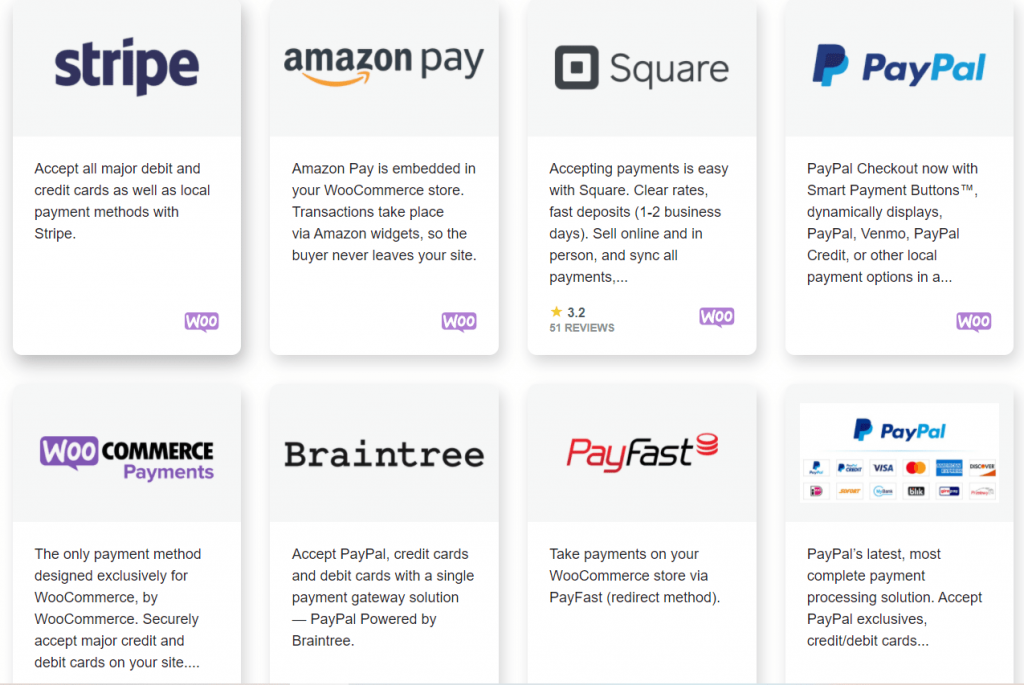
Contrastingly, WooCommerce is a big player in the game of payment gateways. This platform offers over 100 payment methods available as extensions. In addition, this platform provides its own payment processor designed only for WooCommerce stores. This payment plugin is free to download, with no setup or monthly fees.
Analytics
Squarespace provides a wide variety of analytic tools. These tools bring you a real-time overview and detailed analytics of key factors such as visitors, order, revenue, and so on.
For example, you might find out that most customers live in Philadelphia, the U.S.A or maybe email marketing works better than Facebook and Instagram. This kind of statistics will be beneficial for your next campaign.
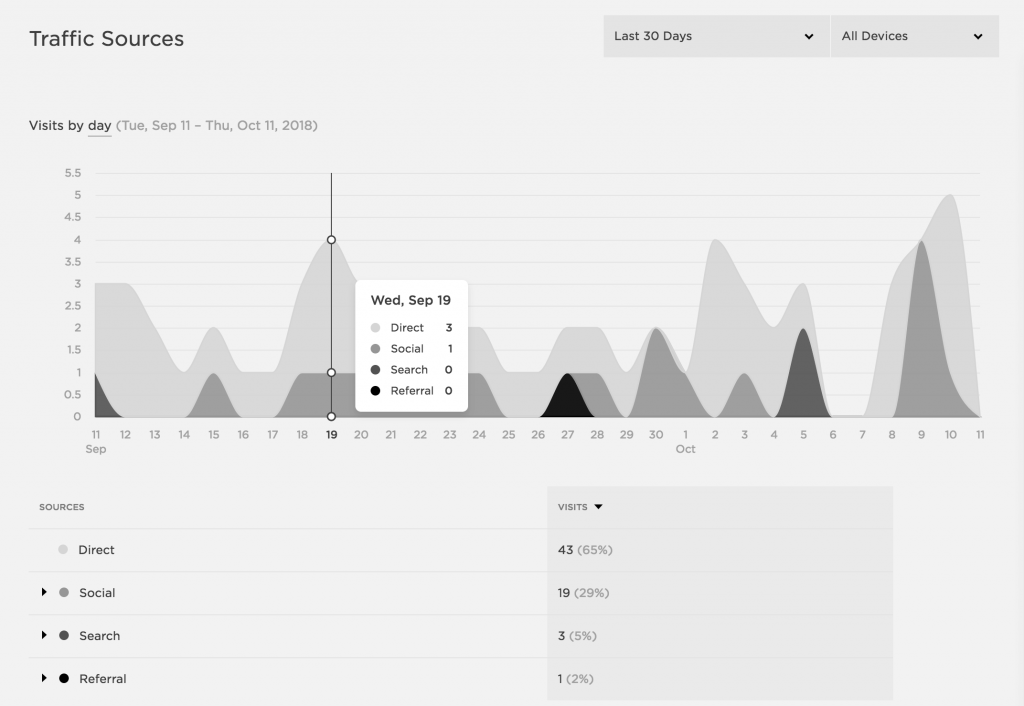
WooCommerce Analytics gives you detailed reports about your revenue, orders, products, categories, coupons, taxes, downloads and stock. You can also further customize your reports for specific product types and categories. Furthermore, WooCommerce enables you to export your data to a CSV file to import into a spreadsheet.
SEO
SEO is the practice of increasing the quantity and quality of traffic to your site through organic traffic search engine results. The firmer your eCommerce SEO strategies are, the closer your online store is to success.

All of the established SEO best practices are automatically built into every Squarespace site. You can change all relevant settings like the product page’s URL, page title and meta description.
Since its inception, WooCommerce has gained a well-deserved reputation for its SEO-friendliness. This platform has built-in features that help to optimize your product pages for search engines. With the WordPress editor, you can make changes to content, images, alt texts, meta descriptions and much more.
At the same time, WooCommerce offers several plugins that support you to optimize your online store. Yoast SEO and All in One SEO Pack are currently two of the most highly-rated SEO plugins.
The only small downside is that WordPress’s loading speed on mobile devices is relatively slow.
Marketing
Email marketing is an important tool in every marketer’s arsenal to achieve a marketing goal. Well-executed approaches can help you craft the perfect email marketing strategy, which in return can boost your lead and drive conversions.
As you sign up for a basic eCommerce plan with Squarespace, you’ll get Mailchimp integration for your site as standard. Moreover, with the tracking email campaign analytics, you can keep track of your campaign and make adjustments if necessary.
Squarespace also comes packed with robust blogging features. You can write posts, enable comments, and push content to social media – all of which will come back to driving customer engagement with your business.
Just like Squarespace, WooCommerce is also outfitted with all of the standout marketing tools you’ll need for your site.
Automated emails are sent out when someone makes a purchase, so you can absolutely use those for branding and advertising other products. However, your best bet is to consider an email marketing service like MailChimp to create personalized emails.
Furthermore, blogging is where WooCommerce shows off its muscles. It inherits all innovative writing blog functions from WordPress, the most popular and dedicated CMS. Accordingly, you can create a blog for WooCommerce by adding a post right from the WordPress Admin dashboard.
Verdict:
Squarespace vs WordPress or Squarespace vs WooCommerce, both are great for eCommerce businesses. WooCommerce seems to be a better match for medium to large-scale stores as this solution gives you a great degree of flexibility and adaptability.
Squarespace, however, is still favored by lots of small businesses because of its minimalism and simplicity. With Squarespace, you can enjoy the “everything is included” approach with all business-crucial functions packaged in.
Need Help To Migrate Your Store?
If you are intending to migrate to WooCommerce, LitExtension offers a great migration service that helps you transfer your data from the current eCommerce platform to a new one accurately, painlessly with utmost security.
#8 Security
All websites are prone to get attacked by cyber thieves. Website security is thus critically important to protect your business against dangerous security risks like abrupt shutdown or data loss.

Squarespace Security
Being a hosted solution, Squarespace takes care of the security tasks for you. It’s the platform’s responsibility to ensure your site stays safe from hackers and all data is backed up.
In fact, all domains connected to Squarespace are protected with free Secure Sockets Layer (SSL) certificates. Besides, Squarespace also provides two-factor authentication, which adds an extra layer of security to your personal and financial information.
WordPress Security
Meanwhile, with WordPress, most of the security falls in your own hands. In other words, you’re the one who are in charge of your own SSL certificate and regular WordPress updates.
You’ve also got to keep in mind that WordPress’ security risks may stem from non-verified 3rd party plugins.
Because the number of WordPress plugins is enormous, ensuring all plugins employ proper safety standards is mission impossible. Therefore, you need to be very careful about which ones you install to your store.
Verdict:
This category is a no-brainer. Squarespace sites are ultimately less vulnerable to malicious codes than WordPress ones. And should something go amiss, the Squarespace team is responsible for addressing the issue for you.
#9 Support
One of the most frequently overlooked and underestimated factors when choosing an eCommerce platform is customer support. Only when you run into some problems, you’ll know how much you need a helping hand.
Squarespace Support
Squarespace customer support is available 24/7 via email and Twitter. This platform has also developed a library of help guides, workshop videos as well as a community forum that can give you insightful responses to almost every question.
The only customer service element that might raise eyebrows is Squarespace’s lack of phone support. Nonetheless, Squarespace creates and tests its own tools so the chances of your website running into issues are fairly low.
WordPress Support
Due to the open-source nature, customer service is essentially nonexistent with WordPress. There’s no live chat, phone, or email support.
But with the enormous user base, you can seek help from a variety of locations: WordPress forum, a hosting company, a plugin provider or a peer who has a good command of the system. In addition, you can come across loads of multiple texts, video tutorials, guidelines compiled by other users.
Apart from that, you can always hire WordPress experts for a more personal level of support. These experts will provide you with WordPress-related services including installation, design, hosting, module development and site-building.
Verdict:
In this support department, Squarespace outshines WordPress. This is simply because when you pay for a Squarespace plan, you already get customer support included with it. So, in case unwanted contingency happens, there’s always somebody at your service. Despite its limitation in customer support, WordPress is suitable for those who want to take control of their own support strategy.
Squarespace vs WordPress – Which One Is Ideal For You?
Both Squarespace vs WordPress are eCommerce giants and each has its own niche.
Squarespace comes out on top when it comes to ease of use, online presence, security, and customer support. Meanwhile, WordPress is a better bet in terms of extensions, content management, flexibility and customizability.
But there are also categories where it’s quite hard to determine the clear winner between Squarespace vs WordPress such as pricing and eCommerce features.
As a matter of fact, there’s no one-size-fits-all answer for deciding between Squarespace vs WordPress. Either might fit you better, depending on your needs, budget, and goals.
Squarespace, without a doubt, is ideal for small to medium-scale businesses. If you’re a layman longing for a stylish site appearance, you should definitely go for Squarespace. Thanks to its wealth of modern, splendid templates, Squarespace is a solid option to showcase your photography portfolio, your blog, or simply items that you’ve handcrafted and wish to sell.
Or else, if you are tempted by the idea of full control over your site, let’s join the WordPress team. With WordPress, you can also enjoy powerful blogging tools as well as a greater degree of functionality and flexibility.
Whenever you choose to create an online store on Squarespace or WordPress, it’s still a smart choice to start selling on multiple channels. You can drive more sales revenue as well as reach huge potential customers if you sell on the top global marketplaces like Amazon, eBay, or Etsy.
Choosing a suitable multi-channel selling tool will help you manage and sync data effortlessly within a single dashboard. Why not give it a try?
Lastly, in case you’re wavering between WordPress and other brilliant CMSs like Joomla or Drupal, you can take a look at our Joomla vs WordPress and Drupal vs WordPress comparison for a comprehensive analysis.
Squarespace vs WordPress – FAQs
[sp_easyaccordion id=”48451″]
Final Words
We have come a long way in reviewing Squarespace vs WordPress and their key differences. Hopefully, this head-to-head Squarespace vs WordPress comparison can serve as a helpful reference during your decision-making process.
If you’re currently using WordPress and you would like to migrate to Squarespace or vice versa, LitExtension – #1 Shopping Cart Migration Expert is always happy to help.
Besides Squarespace vs WordPress, we currently support data migration for over 140 most popular platforms. At LitExtension, we ensure accuracy and the highest level of security to your data with a 30-day money-back guarantee and 24/7 dedicated support.
Lastly, let’s join our Facebook community for more eCommerce tips and news!